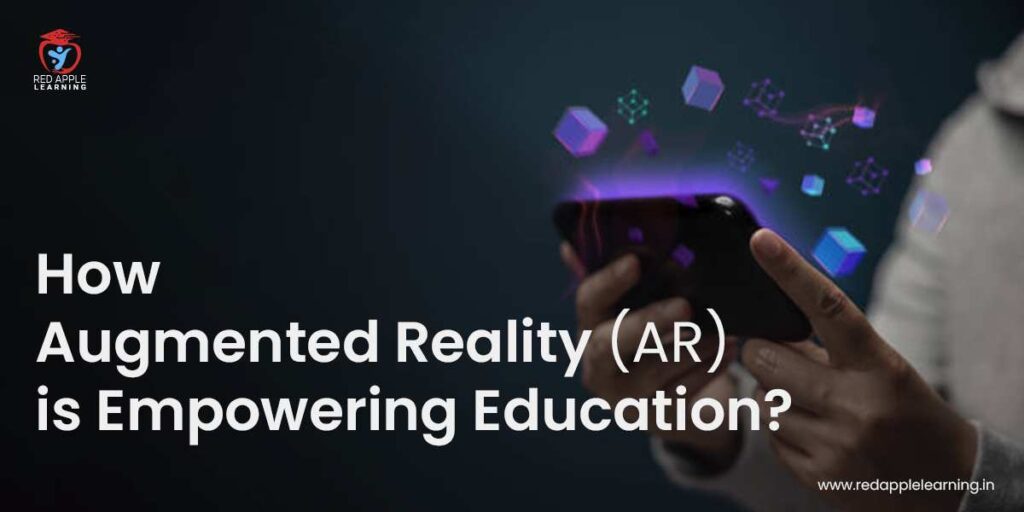How Augmented Reality (AR) is Empowering Education?

In the ever-evolving landscape of education, technology has become an indispensable tool for both students and educators. Among the many technological innovations that have left a profound impact, Augmented Reality (AR) stands out as a game-changer. AR is not just about gaming or entertainment; it has found its way into classrooms, lecture halls, and educational settings of all kinds, redefining the way we learn and interact with the world around us. Therefore, in this blog, we will embark on a journey to explore how Augmented Reality is empowering education. We will be splitting this blog into two parts: The first will be “AR in Classroom”, and the second will be “Future of AR in Education”. Let’s start the blog without much delay!
AR in the Classroom
A Dynamic Learning Experience
Imagine a classroom where textbooks come to life; how interesting it will be, won’t it? Think about historical figures stepping out of the pages and complex scientific concepts visualized in 3D! This is the promise of AR in education. Augmented Reality effortlessly bridges the gap between theory and practice, making learning more engaging and interactive for the students. It also transforms traditional, static learning materials into dynamic experiences that captivate students’ attention and promote a better understanding of each concept.
Interactive Textbooks
With the changing times, traditional textbooks are undergoing a digital metamorphosis. With the assistance of AR, students can scan pages with their smartphones or tablets, unlocking a wealth of multimedia content. For example, a history book might transport students to ancient Egypt, allowing them to explore the pyramids or interact with historical figures like never before!
Enhanced Science Education
AR apps are also revolutionizing the way we teach science. Students can dissect virtual frogs, explore the solar system, or watch chemical reactions unfold in real time. These immersive experiences not only make learning fun but also reinforce the critical concepts before them. Furthermore, it’s worth noting that augmented reality (AR) assumes a pivotal role within the domain of game development courses. AR not only captivates learners but also enhances their understanding of game development concepts, offering a dynamic and engaging educational experience that bridges the gap between theory and practical application. This innovative technology has become an invaluable tool for aspiring game developers, providing them with immersive opportunities to explore and create in the ever-evolving world of game design.
Tailored Learning
One of the greatest strengths of AR in education is its ability to cater to individual learning styles. No two students are the same, and AR technology recognizes this diversity by offering customized learning experiences.
Adaptive Learning Paths
AR apps can adapt to a student’s pace and level of understanding. If a student struggles with a particular concept, the app can provide additional explanations or exercises until mastery is achieved.
Accessibility for All: Without discriminating any student
AR technology can be a game-changer for students with disabilities. It can provide visual and auditory cues to assist those with hearing or visual impairments, ensuring that education is truly inclusive. Now, in the next section, we will be focusing on the future of augmented reality in education.
The Future of Augmented Reality (AR) in Education
Remote and Hybrid Learning
The COVID-19 pandemic accelerated the adoption of online and hybrid learning models. AR can enhance these models by providing a sense of presence and interactivity. Students can collaborate on projects, conduct virtual experiments, and attend virtual field trips, all from the comfort of their homes.
Lifelong Learning
As the job market becomes increasingly competitive, the importance of lifelong learning cannot be overstated. AR can facilitate this continuous learning journey by offering accessible, on-demand educational resources. Professionals can upskill or reskill by immersing themselves in AR-powered courses and simulations.
Real-world Applications
The integration of AR is not limited to traditional educational institutions. Industries are recognizing the value of AR for training and development. From medical students practicing surgeries in AR to automotive technicians learning to repair complex machinery, AR makes learning more effective and efficient across diverse fields.
Bridging the Gap
AR can potentially bridge the gap between theoretical knowledge and practical application. Students can gain hands-on experience and develop problem-solving skills in a safe virtual environment. This practical knowledge is invaluable in preparing students for the challenges of the real world.
To Wrap Up
Augmented Reality is ushering in a new era of education where learning is dynamic, immersive, and tailored to individual needs. As AR technology continues to advance and become more accessible, its impact on education will only grow. The future promises a transformative educational experience that prepares students not just for exams but for the challenges and opportunities of an ever-changing world. By harnessing the power of AR, we are empowering the next generation of learners to explore, innovate, and excel in ways we could only dream of in the past. The classrooms of tomorrow are being shaped by the realities of today, and Augmented Reality is leading the way.
